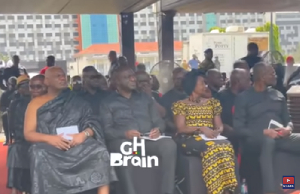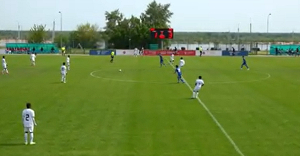Opinions of Friday, 17 April 2020
Columnist: Benjamin Kwasi Afrifa, Contributor
Ghana’s 2020 general elections should proceed as scheduled
No matter what other impact the novel coronavirus (COVID-19) has on our society, one thing is certain: Ghana’s December elections will be the first of its kind regarding how the ballots are cast and counted. Ghana has preserved the legal certainty of organizing national elections since 1992.
History dictates that the December 2020 elections will be followed by a constitutionally mandated inauguration of the next president on January 20, 2020. Understandably, the country is preoccupied with the COVID-19 response and the health of the national economy. The question as to how Ghanaians will place their votes in the December 2020 elections is becoming the urgent priority that it needs to be. I am outlining a sweeping new proposal designed to address this critical issue. There are murmurs that the 2020 Presidential and Parliamentary elections may either be cancelled or postponed if the virus persists into the fall. Any change to the scheduled vote will plunge the country into a constitutional crisis. The complications of conducting the 2020 elections during the pandemic are increasingly evident. COVID-19 will have a significant impact on voter turnout as some voters may stay away from the polls on Election Day for fear of person-to-person transmission of COVID-19.
The election management bodies (EMBs) of Ethiopia, Cameroon, Kenya, Nigeria, South Africa, Chile, Serbia, France, Sri Lanka and The United Kingdom have either cancelled or postponed the polls. South Koreans voted on April 15, 2020 as the country’s widely lauded strategy of stringent testing, contact tracing and isolation, and limited lockdown measures are working. The Korean public has voluntarily complied with social distancing.
For Ghana to avoid constitutional and political chaos, Parliament must immediately pass legislation that allocates sufficient funds to enable the EC to acquire the infrastructure -training of poll workers, improvement in voter registration, technology, operational logistics, polling station and queuing management, crowd control, pathways to provide access to disabled voters, etc.- needed to create options for voters to cast their ballots in December. These options include:
i) Increasing the number of polling stations. Adding additional polling stations will prevent overcrowding in lines at polling stations while enforcing social distancing between voters. The EC should build exit and entry protocols to avoid crowds in closed spaces; display posters promoting respiratory hygiene or cough etiquette; regularly disinfect all polling stations and run temperature checks at the entrances. Anyone showing temperature readings higher than 37.5 °C (99.5 °F) should be directed to special booths. Voters should be provided with hand sanitizer and plastic gloves when they enter the voting booths, and pollsters must practice social distancing at least a meter away from each other while waiting in line. Masks should be available for distribution to those who may not be wearing one.
Ensure there is an ample supply of disposable pens for voters and direct polling station workers to avoid unnecessary handling of voting and identification materials.
ii) Make voting by mail-in ballots a clear and free option. The EC should work with the Postal Service to ensure that mail-in voting runs smoothly and without undue delays. The ballots must be prepaid postage to avoid voters having to pay to vote. This will require investments in human and technological resources such as ballot scanners to count the votes and signature-matching software to help authenticate voter identity without introducing partisan bias into the process. For mail-in ballots with unmatched signatures, voters may cast provisional ballots in person at poll stations, if necessary. This will reduce overcrowding and thereby increase voter participation and turnout.
iii) Expand the absentee ballot measure. This privilege is currently the preferred option available only to members of the diplomatic corps, soldiers on peacekeeping missions and students studying abroad on government scholarships. With less than 1,000 COVID-19 cases, special arrangements must be made for those who have contracted the disease and are housed at the National COVID-19 Treatment Center, quarantine centers, such as hotels, and those who have symptoms but do not require formal hospitalization. Those in hospitals can vote by mail or use early absentee voting stations that should be set up at hospitals.
iv) Ease voter registration requirements and allow same-day registration and voting. The EC should expeditiously resolve the perennial issue with voter registration and identification requirements. Given the compressed 2020 elections calendar, the EC, in consultation and cooperation with the Inter-Party Advisory Committee (IPAC), political parties and civic organizations, must agree to use the 2016 voter register as a baseline for the 2020 elections. Limited registration for first-time voters must also be permitted. The EC should thereafter present the compiled voter registrations to Parliamentary for ratification. This may be contentious and inconvenient, however desperate times call for desperate measures.
v) Extend the voting hours on Election Day. The government’s powers of quarantine and punishing violators should be relaxed on Election Day. This will enable voters who travel to cast their ballot to reach the polls.
vi) Extend the election period to a three- to five-day voting period. A longer voting period will give all voters an opportunity to cast their ballots.
vii) Move voter registration online to make it easier. This will be especially attractive to eligible teenagers and first-time voters.
viii) Establish a special, bipartisan Voter Fraud Commission with authority to expeditiously investigate fraudulent election issues and where necessary make referrals to law enforcement. Moreover, the election results should be treated as indisputably legitimate and a reflection of the will of the people. The EC must delay the announcement of the results to ensure that all ballots- including mail-in and absentee ballots- are recorded and counted.
As referenced earlier, instituting the mail-in ballot is a great way to practice social distancing to avoid person-to-person transmission of COVID-19. Expanding this option would require special effort by the EC and all stakeholders. The EC has to educate voters with clear and simple instructions about handling and returning their mail-in ballots. The Postal Service is one option, but specialized boxes with camera monitors would have to be installed at specialized drop-off centers such as Police Stations, Post Offices, government offices, banks, and schools, etc. to receive the ballots. The EC must also closely collaborate and cooperate with political parties to adapt to the new election realities. Enforcing campaigning activities that are decidedly more low-key than in previous elections. Our political parties should not exploit the pandemic to suppress democratic exercise or create endless litigation. An election should not appear to be a sham tainted by partisan manipulation. We simply can’t have the legality of an election be decided by partisan politics.
These recommendations do not underestimate the workload, logistical challenges, legal deadlines and the EC’s tight calendar of activities.
Rather, they reflect the constitutional, legal and political realities the country faces regarding the 2020 elections. We should not restrict voting across the country in a manner designed to hurt voter participation and turnout. The current COVID-19 pandemic guidelines make no mention of what happens in the 2020 elections.
As we collectively face down the pandemic, what we know is that COVID-19 is like a pole vaulter taking flight: the outbreak starts slowly, takes off rapidly, reaches a peak and then comes back down to the earth. Right now, we need to flatten that peak. By taking steps to mitigate and contain the further spread of COVID-19, we need to resource our healthcare personnel and institutions so they can handle the pandemic.
Citizens have a crucial part to play. While the fatality rate is extremely low, we need to do everything to protect ourselves, to protect others and protect our healthcare workers. This means heeding the expert health advice and using common sense.
Ghanaian electorate can sustain a national election even during a deadly pandemic. Thus, the 2020 polls will be another milestone of continuity for Ghana’s experiment in constitutional self-government.
The American idiomatic expression “we can walk and chew gum simultaneously” is applicable here: we can protect ourselves from COVID-19 while protecting our elections and democracy. Over the last three years, much of what Ghanaians hold dear has been upheld – democracy, civility, truth. Postponing the election will set a bad precedent even in this time of acute national stress. The 2020 elections will take place under unprecedented circumstances, nevertheless, it should proceed as scheduled.













